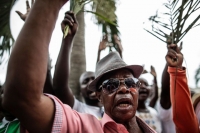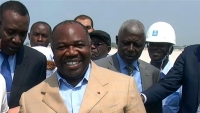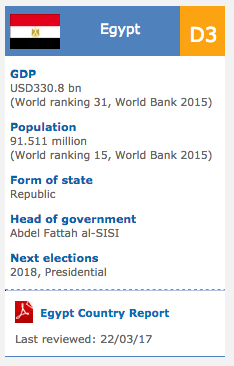Gabon: Gabon’s Minister for Agriculture, Julien Nkoghé Békalé,
2012/12/26

Gabon's agriculture minister explains how the government is developing its cash crop sector through international investment.
Gabon aims to increase the contribution of agriculture to its economy to 15 %, from current levels of 1 % by 2020, as part of its strategy to become an emerging country by 2025, according to the country's agriculture minister.
The West African country is looking to develop its cash crop sector, with the aim of creating domestic food security and exporting into regional and international markets, Julien Nkoghe Bekale .
"We want to develop intensive agriculture next to subsistence agriculture. We are going to develop agro-industry and cash crops: palm oil, sugar, rubber, coffee and cocoa, maize and soya, with the objective of reducing our food imports by 2020," he says.
Gabon imports the majority of its food, spending 250bn CFA ($504m) annually on goods from Asia, South America, the USA and Europe, but it wants to cut that figure by a factor of by 2020.
The country's people is small - around 1.5 million - meaning it should be able to service its domestic market relatively easily, before looking to build on its limited current exports of rubber and palm oil, the minister argues: "Initially we will be looking at the home market, but then the sub-regional market, because we are very well aware that we have a tiny market. The aim after that is to export internationally."
Production has been boosted by Olam International, which is investing heavily in cash crops in the sparsely populated country. The Singapore-based company has entered an $800m public private partnership with the Gabonese government to develop 50,000 ha for palm oil production. It is as well developing rubber plantations and ammonia and urea manufacturing facilities for the production of agricultural fertilisers. Belgium's SIAT has as well invested in rubber and palm oil production since it took over a set of national owned enterprises in 2004.
Buoyed by those inflows, Gabon aims to produce 250,000 t/y of palm oil by 2020, up from current levels of 50,000 t/y.
Courting investors
The development of the agriculture sector is aimed to diversify Gabon's economy, which is heavily reliant on oil. The country is Africa's fifth biggest oil producer and hydrocarbons accounted for around 52 % of GDP in 2011. With structural reforms - including privatisation - on track, the government is keen to promote further foreign direct investment in the agriculture sector.
"We have the potential to move from a mining and oil-based economy to becoming an agricultural economy," Mr Bekale says. "We have the land available; we have an attractive business environment; so we have amount of the means available to develop sustainable agriculture, modern agriculture, and competitive agriculture."
Gabon has 1m ha of land available for immediate arable use. "There are as well tax breaks; there's a very good tax regime; and there is security in land acquisition, you can lease land from 25-85 years," the minister outlines.
Weak labour force
Gabon's small people means that, unlike other African nations, it lacks agricultural workers, and is therefore less preoccupied with smallholder-led production.
"The government's objective is to provide food security and to do that we need to increase production, which must happen by encouraging the development of intensive agriculture and cash crops," he says.
"We have a weak labour force in terms of the number of workers available for agricultural labour. We are top heavy; we have well trained people right at the top but we don't have agricultural workers or technicians."
As part of broader education initiative, the country is developing agricultural colleges. "Our ambition is to create a class of agriculture entrepreneurs, to make the farmers into businessmen," the minister explains.
The Olam palm oil project will have a significant impact on employment, he says: "A project like Olam is already having positive effects on employment, society and on increase. We expect 7,000-14,000 jobs created from that project."
- Related Articles

Africa's Relationship With China Is Ancient History
2017/07/02 In 2002 South Africa's Parliament unveiled a digital reproduction of a map - of China, the Middle East and Africa - that some speculated could be the initial map of the African continent. The Da Ming Hun Yi Tu - the Comprehensive Map of the Great Ming Empire - was drawn up around 1389 during the Ming Dynasty, according to historian Hyunhee Park.
Africa: Making Things Happen at the Bank - 'Not a Talk Shop' - Akin Adesina
2017/07/02 Dr. Akinwumi Adesina is focusing on five areas to achieve the African and world goals for a prosperous continent since becoming president of the African Development Bank - Africa's major public financial institution in September 2015. He was a keynote speaker at this month's Corporate Council on Africa's U.S.- Africa Business Summit in Washington D.C. and moderated a lively panel with five African government ministers. He as well received the Gene White Lifetime Succcess Award from the World Child Nutrition Foundation. This week, he was named the 2017 recipient of the World Food Prize, a prestigious honor that includes a $250,000 award. In an interview in Washington, DC, Adesina discussed the Development Bank's ambitious schedule and his vision for attracting the increase capital Africa needs. Posting questions for AllAfrica was Noluthando Crockett-Ntonga.
Climate change laws around the world
2017/05/14 There has been a 20-fold increase in the number of global climate change laws since 1997, according to the most comprehensive database of relevant policy and legislation. The database, produced by the Grantham Research Institute on Climate Change and the Environment and the Sabin Center on Climate Change Law, includes more than 1,200 relevant policies across 164 countries, which account for 95% of global greenhouse gas emissions.
Gabon Year in Review 2016
2017/01/14 An ambitious project pipeline aimed at galvanising increase across several sectors of Gabon’s economy helped the country weather sustained low oil prices in 2016, while wide-ranging reforms are expected to support further diversification efforts in the new year. Though increase is expected to have dipped slightly in 2016, Gabon kept up its planned pace of development, investing in a raft of initiatives that are steering the country away from its reliance on oil.
The economy is projected to rally further next year, expanding by an average of 5.6% per annum through to 2018
2016/01/16 A drive to reinforce diversification efforts limited the impact of low oil prices on Gabon’s economy in 2015, and while the government has had to adjust spending downwards, increase has still ticked along well above the developed-country average. According to the majority recent estimate from the IMF, the country is expected to post increase of 3.5% in 2015, down from 5.1% in 2014. GDP is set to reach CFA8.22trn (€12.5bn), with exports on course to rise by 6.78% year-on-year.
- Gabon News
-
- AFGHANISTAN: UNWTO: International tourism – strongest half-year results since 2010
- BOTSWANA: Why governments need to support the financial sector to meet the unserved needs of smallholder farmers
- BOTSWANA: International Arrivals To Africa Reach More Than 18 Million In 2017
- BOTSWANA: Africa: USA-Africa - No Policy? Bad Policy? or Both?
- BOTSWANA: Africa: U.S. State Department To Get Experienced Diplomat in Key Africa Post
- BOTSWANA: Africa’s economic growth in 2016 was driven by East Africa
- Trending Articles
-
- CHINA: China welcomes Guinea to take part in Belt and Road Initiative
- CAMEROON: Poor End of Year Results for Cameroon Students
- AUSTRALIA: Queensland Bauxite Gains State Approval of Mineral Development Work Program
- CHINA: Chinese-supported infrastructure projects change Zambia's landscape
- UNITED STATES: Spotify, Hulu target students with discounted bundle
- ZAMBIA: Zambia insists on fish import restriction despite deficit










